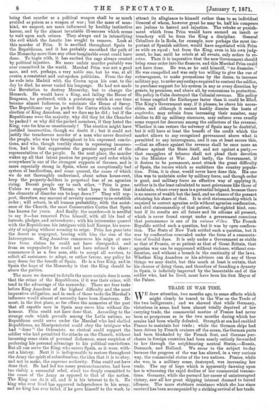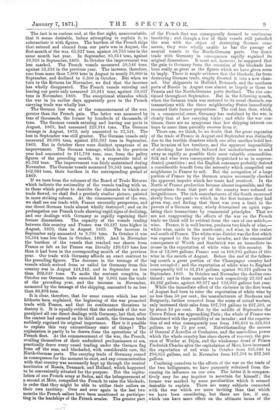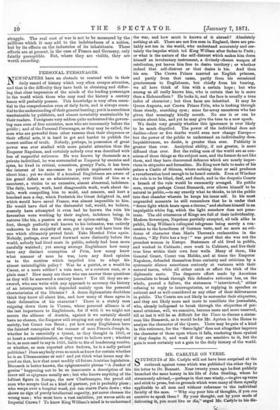TRADE IN WAR TIMFI.
WE drew attention, two months ago, to some effects which might clearly be traced to the War on the Trade of the two belligerents ; and we showed that while Germany, victorious in arms, had been almost totally deprived of her carrying trade, the commercial marine of France had never been so prosperous as in the two months during which her armies had been wholly defeated. Strength at sea had enabled France to maintain her trade ; while the German ships had been driven by French cruisers off the ocean, the German ports had been blockaded by the French fleet, and German pur- chases in foreign countries had been nearly entirely forwarded to her through the neighbouring neutral States,—Russia, Denmark, and Holland. We recur to the subject to-day because the progress of the war has altered, in a very curious way, the commercial status of the two nations. France, while she was, in a military sense, destroyed, was increasing her trade. The ray of hope which is apparently dawning upon her is witnessing the rapid decline of her commercial transac- tions. Germany, while she pursued her career of uninterrupted victory, saw all her great shipping interest doomed to forced idleness. The more stubborn resistance which she has since received has been accompanied by a striking revival of her trade.
The fact is so curious and, at the first sight, unaccountable, that it seems desirable, before attempting to explain it, to substantiate it with figures. The burthen of the French ships that entered and cleared from our ports was in August, the first month of the war, 65,927 tons, against 58,765 tons in the same month last year. In September, 85,614 tons, against 59,939 in September, 1869. In October the improvement was less marked. The French vessels measured 59,546 tons, against 53,233 in the previous year. The increase, therefore, rose from more than 7,000 tons in August to nearly 26,000 in September, and declined to 6,300 in October. But when we turn to the Returns for November, we find that the increase has wholly disappeared. The French vessels entering and leaving our ports only measured 59,811 tons, against 59,937 tons in November, 1869. The exceptional stimulus which the war in its earlier days apparently gave to the French carrying trade was wholly lost.
The German loss was, at the commencement of the war, greater than the French gain. The latter was measured by tens of thousands, the former by hundreds of thousands, of tons. The German vessels entering and leaving our ports in August, 1869, had measured 229,914 tons. The German tonnage in August, 1870, only amounted to 37,521. The loss in September was still greater. The German vessels only measured 28,095 tons, against 235,397 tons in September, 1869. But in October there were distinct symptoms of an improvement. The German tonnage, which in the previous year had amounted to 211,798 tons, rose, from the paltry figures of the preceding month, to a respectable total of 85,782 tons. The improvement was fairly maintained during November. The German vessels measured 70,543 tons, against 162,084 tons, their burthen in the corresponding period of 1869.
If we turn from the columns of the Board of Trade Returns which indicate the nationality of the vessels trading with us, to those which profess to describe the channels in which our trade flowed, we shall find a precisely similar picture, painted in more striking colours. At the commencement of the war, we shall see our trade with France unusually prosperous, and our direct German trade almost wholly destroyed ; and on its prolongation our French trade showing rapid signs of declining, and our dealings with Germany as rapidly regaining their former dimensions. The capacity of the vessels trading between this country and France was 60,127 tons higher in August, 1870, than in August, 1869. The increase in September only amounted to 9,705 tons. In October it was 95,564 tons less than in October, 1869. And in November the burthen of the vessels that reached our shores from France or left us for France was literally 120,639 tons less than it had been in the corresponding month of the previous year. Our trade with Germany affords an exact contrast to the preceding figures. The decrease in the tonnage of the vessels which arrived from or sailed for Germany from this country was in August 124,242, and in September no less than 202,649 tons. To make the contrast complete, in October our German trade exceeded by 9,061 tons the trade of the preceding year, and the increase in November, measured by the tonnage of the shipping, amounted to no less than 80,898 tons.
It is clear, therefore, that for some reason which has not hitherto been explained, the beginning of the war promoted trade with France, and that its continuance threatens to destroy it. It is equally evident that the outbreak of the war paralyzed all our direct dealings with Germany, but that, after the contest had entered on its third month, the German trade suddenly regained its original importance. How is it possible to explain this very extraordinary state of things ? The explanation is partly to be drawn from the operations of the French fleet. At the commencement of the war, the French, availing themselves of their undoubted predominance at sea, practically drove every vessel trading under the German flag from off the seas, and blockaded, with considerable care, the North-German ports. The carrying trade of Germany ceased in consequence for the moment to exist, and any communication with that country was necessarily kept up through the neutral territories of Russia, Denmark, and Holland, which happened to be conveniently situated for the purpose. But the capitu- lation of one French army at Sedan, and the beleagnerment of a second at Metz, compelled the French to raise the blockade, in order that they might be able to utilise their sailors on their own territory. Over and over again in the last two months the French sailors have been mentioned as participa- ting in the hardships of the French armies. The greater part of the French fleet was consequently doomed to continuous inactivity ; and though a few of their vessels still patrolled the seas with the object of destroying German com- merce, they were wholly unable to bar the passage of neutral vessels to the North-German ports. Our direct trade with Germany in consequence rapidly regained its original dimensions. It must not, however, be supposed that the gain to Germany from the cessation of the blockade has been really as great as the figures which we have given seem to imply. There is ample evidence that the blockade, far from destroying German trade, simply diverted it into a new chan- nel. Our shipments to Holland, Denmark, and the northern ports of Russia in August rose almost as largely as those to Prussia and the North-German ports declined. The rise con- tinued throughout September. But in the following month, when the German trade was restored to its usual channels, our transactions with the three neighbouring States immediately resumed their former proportions. The real loss, then, which, in a commercial sense, Germany has sustained by the war, is clearly that of her carrying trade ; and while the war con- tinues, there are no symptoms that her shipping interest can hope to more than partially recover from it.
There can, we think, be no doubt that the great expansiort of the trade of France in August and September was distinctly due to the terrible disasters which one after another befell her. The invasion of her territory, and the apparent impossibility of checking her invader, induced her manufacturers to send away as rapidly as possible their most valuable commodities. Silk and wine were consequently despatched to us in unprece- dented quantities ; and the English consumer probably derived a considerable benefit from the necessity which compelled our neighbours in France to sell. But the occupation of a large portion of France by the German armies necessarily checked the apparent impulse which her trade had received. In the North of France production became almost impossible, and the exportations from that part of the country were reduced to insignificance. The rich manufacturers of the South recovered
slowly from the panic to which in the first instance they had given way, and finding that there was even a limit to the powers of a German army, wisely determined on again regu- lating their transactions by commercial principles. That we- are not exaggerating the effects of the war on the French trade we think will be evident from the case of one article,-- wine. France, it is well known, produces two kinds of wine,- white wine, made in the north-east ; red wine, in the centre. -
and south of France. The white-wine district was the first which was exposed to the fury of the invader, and the commercial consequence of Worth and Saarbriick was an immediate in- crease in the exportation of white wine to this country. In lieu of 72,900 gallons, France sent us 108,195 gallons of this wine in the month of August. Before the end of the follow- ing month a great portion of the Champagne country had been occupied ; and the exportation of white wine to England consequently fell to 51,218 gallons, against 90,973 gallons in September, 1869. In October and November the decline con- tinued; and in those months we took respectively 27,697 and 40,282 gallons, against 89,977 and 132,936 gallons last year.
While the immediate effect of the victories in the first week of August had been to raise the exportation of white wine by no less than 50 per cent., the manufacturers of Bordeaux and Burgundy, farther removed from the scene of actual warfare, only increased their sales from 197,701 gallons to 237,593, or by about 19 per cent. But by the middle of September the Crown Prince was approaching Paris ; the whole of France was threatened with the possibility of an invader ; and the exporta- tion of red wine consequently rose from 186,854 to 324,954 gallons, or by 75 per cent. Notwithstanding the success of General d'Aurelles at Coulmiers, and the marvellous power which the whole country has since shown of recovery, the pre- ence of Werder at Dijon, and the wholesome dread of Prince Frederick Charles after the capitulation of Metz, have increased the exportation of red wine in October from 165,546 to 298,055 gallons, and in November from 197,701 to 237,583 gallons. Confining ourselves to the effects of the war on the trade of the two belligerents, we have purposely refrained from dis- cussing its influence on our own. The latter it is compara- tively easy for any inquirer to ascertain for himself ; the former was marked by some peculiarities which it seemed desirable to explain. There are many subjects connected with the war which are more inviting than that which we have been considering, but there are few, if any, which can have more effect on the ultimate issues of the
struggle. The real cost of war is not to be measured by the millions which it may add to the indebtedness of a nation, but by its effects on the industries of its inhabitants. These effects are at present, in the case of France and Germany, only faintly perceptible. But, where they are visible, they are worth recording.
































 Previous page
Previous page